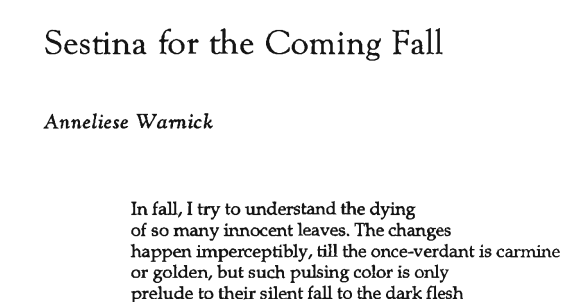Articles/Essays – Volume 26, No. 1
Sestina for the Coming Fall
In fall, I try to understand the dying
of so many innocent leaves. The changes
happen imperceptibly, till the once-verdant is carmine
or golden, but such pulsing color is only
prelude to their silent fall to the dark flesh
of life that decayed before them. A nectarine
isn’t so silent when it falls from a nectarine
tree—the stem snaps, leaves shudder as the dying
moves past them to the ground, where bruised flesh
of a once-blossom will yield to changes
wrought by moisture and parasite. Only
a ravaged pit ever remains of the once-carmine
fruit. My cheeks turn carmine
at your suggestion that a nectarine
is simply a swollen womb. I could agree, only,
so cruel that they would fall and be left dying.
One of the necessary changes,
you say. We inherit it with the flesh.
If we will fall I want first to mingle with your flesh;
we can begin with one kiss on carmine
lips and invoke the power ripe with changes
like the pregnant passing of an autumn nectarine.
Break the yielding stem for I am dying
to be awakened by you only.
In dreams sometimes, she remembered of the fall only
the weight of him against her flesh.
The space between them was too small to think of dying,
for their impressions there seemed ever carmine
like the rosy skin of a young nectarine
before tiny bruises hint of changes.
She wanted none of the painful changes
and wished sometimes only
to have refused the so succulent nectarine.
But new fruit was born of their flesh
and pulsing veins would not be coursing carmine
if they hadn’t fallen together toward dying.
In fall I see changes and you show me the nectarine:
suspended only briefly above dying,
her flesh swollen with spring and sweetly carmine.


 Back to full Issue
Back to full Issue

